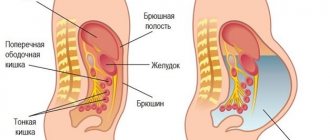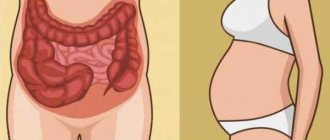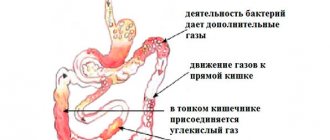Physiological reasons
The physiological causes of constipation and flatulence can roughly include those caused by improper eating behavior, namely:
- systematic overeating, leading to a deficiency of digestive enzymes;
- consumption of sweet carbonated drinks and products that cause fermentation and gas formation in the intestinal lumen;
- simultaneous consumption of incompatible foods (that is, those whose digestion and assimilation are carried out according to a different “scheme”);
- violation of the rules of eating (hasty, disorderly eating at different times of the day, excluding thorough chewing, eating in combination with lively conversations, reading while eating);
- abuse of sweets that stimulate fermentation;
- food dry and on the go;
- deficiency in the diet of fiber, vital for adequate intestinal function;
- alcohol abuse and smoking, which cause persistent atrophy of the mucous membrane of the stomach and upper digestive tract;
- uncontrolled long-term use of certain medications;
- excess fat in the diet, which inhibits the peristaltic movements of the intestines.
People who lead a sedentary lifestyle are also at risk.
Useful video
We recommend watching the following video:
source: yadoktor.net Published: January 22, 2021 at 11:07
Symptoms such as bloating, constipation, discomfort in the intestines when a person is “bloated”, associated with digestive disorders, occur for various reasons. These signs are not very dangerous, but due to the fact that they significantly disrupt the patient’s standard of living, they must be treated. The question of what to do with this form of gastrointestinal disease, how to get rid of these negative manifestations, and what therapy is best able to help - diet or medications, worries many people. In order to find out all the nuances of this pathological condition and learn to help yourself, if necessary, on your own, you should find out the most common causes of bloating and constipation, as well as the treatment methods that need to be used in the case when prolonged stool retention provokes the patient to develop a large belly from accumulated there are no gases.
Such disturbances in the functioning of the digestive tract can arise due to various prerequisites, the most common of which are errors in the human diet. Gases accumulated in a person’s stomach, released during the digestion of certain foods and drinks, always lead to bloating. It is for this reason that experts do not recommend that people who often experience severe bloating and constipation eat large quantities of legumes and cabbage, or drink sugary carbonated drinks. It is they who cause such a pathological condition as flatulence and violation of bowel movements. Almost all patients, after correcting the diet, experience significant improvement, and negative signs that impair the quality of life disappear.
Also, bloating appears as a result of the activity of pathogenic microflora that accumulates in the intestines during constipation. The reason for this is that the bacterial flora produces an increased amount of gas. This situation is provoked due to the fact that poorly digested food reaches the colon, populated by these microorganisms, and gets to them. As a result, gas formation increases. In such a situation, prolonged constipation always causes severe bloating. To get rid of this negative phenomenon, you should also adjust your diet by introducing foods containing plant fiber into your diet. But treatment with laxatives in a situation where the stomach is swollen due to constipation can be carried out only in exceptional cases, and with exactly the drugs recommended by the specialist.
Many people are interested in what to do for constipation and bloating? What are the main aspects of treating this pathology? In order to learn how to cope with these negative symptoms on your own, you should consult a specialist. He will help identify the cause that provokes it and select the most appropriate treatment in each specific case, which will help the patient get rid of the negative signs of the disease, when a person is very bloated. Therapy for this form of the disease must be comprehensive. Drug treatment of constipation, bloating and abdominal swelling is required if it is the result of the activity of pathogenic microorganisms. In addition to taking pills, the patient’s attention is drawn to increasing physical activity and dietary nutrition.
Pathological causes
Pathological causes include any violations of the secretory, motor and excretory activity of the gastrointestinal tract, including those of an organic nature:
- lactase deficiency, which makes it impossible to digest whole milk;
- intolerance to gluten, which is part of most types of wheat flour;
- pathological deviations of stomach acidity in any direction;
- neurological disorders;
- dysbacteriosis;
- inflammatory processes of the gastrointestinal tract that have become chronic;
- infections;
- lethargy and any disturbances in intestinal patency, for example, in the presence of postoperative adhesions;
- irritable bowel syndrome (IBS);
- enzyme deficiency of the small intestine;
- deficiency of bile and pancreatic juice;
- helminthic infestations.
A number of chronic diseases of the digestive system are asymptomatic at a certain stage, so the nature of flatulence and constipation can only be determined based on the results of a thorough examination.
Symptoms of flatulence and stool retention
Symptoms of flatulence cannot be ignored. Typically this is:
- painful feeling of distension and fullness of the intestines;
- frequent emission of gases (flatulence), which, however, does not bring noticeable relief;
- frequent foul-smelling belching, sometimes with a bitter aftertaste;
- stabbing pains in different parts of the peritoneum (depending on the location of gas accumulation), having a spastic nature;
- in complicated cases - a significant increase in the volume of the peritoneum.
The norm is daily full (voluminous) stool at the same time (ideally in the morning), which does not require excessive effort.
Main symptoms of constipation:
- stool retention for more than 2 days;
- lack of appetite, general lethargy;
- incomplete (partial) stool in the form of small fragments (so-called fecal stones), often traumatic to the rectum;
- nausea as a consequence of increasing intoxication;
- obvious discomfort during defecation, increasing signs of hemorrhoids (painful nodes or cracks in the anus).
The consequence is a gradual breakdown of the entire digestive process. A dangerous complication of constipation is the development of complete intestinal obstruction.
What are the dangers of constipation?
The most important role in the etiology of constipation is played by mechanical and chemical irritations associated with the nature of food, and disorders of the nervous system (lowering the threshold of excitability of intestinal receptors). Over time, constipation inevitably causes inflammatory processes in the intestinal mucosa.
The leading role in the pathogenesis of constipation is played by the large intestine, in which, in fact, the compaction and formation of feces occurs. The mechanism of constipation is inhibition of the forward movement of food in the direction of the rectum. In the case of prolonged contraction of circular muscle fibers, so-called spastic constipation is observed. If peristalsis disorder occurs due to relaxation of the intestinal muscles, then constipation is called atonic. Such constipation is typical for the upper intestines.
Stagnation of feces provokes the colonization of the intestines by pathogenic microbes, especially against the background of insufficiency of bile, gastric juice and a decrease in the body's resistance.
The stagnant nature of the ongoing processes endows the intestinal contents with toxic properties, which is especially pronounced in the large intestine. Intestinal self-poisoning is doubly dangerous in cases of liver or kidney failure and in cases where the absorption of toxic products is increased due to inflammatory processes in the intestinal walls.
Acute self-poisoning of the body entails disorders of the nervous system and metabolism, a general deterioration in health, headaches, and weight loss.
Causes of bloating and frequent constipation in adults
Flatulence is a complex symptom. Some patients describe their sensations as bursting, others feel a burning sensation and tingling in the lower abdomen, others talk about incessant cramps and constant fullness of the stomach. With a long delay in emptying and stagnation of fecal matter in the intestines, pain occurs. The intensity varies from mild to acute cutting pain, in which hyperventilation syndrome is also observed. In particularly sensitive people, blood pressure may increase, the skin may turn pale, and arrhythmia and tachycardia may appear.
If bloating, increased formation of gases and constipation are observed for several days, this is an alarming signal: general intoxication begins in the body, and the condition worsens so much that medical assistance becomes the only salvation.
In some cases, constipation is accompanied by additional symptoms, namely:
- Abdominal muscle tension;
- Bad breath;
- Sleep disturbance;
- Nervousness and irritability.
With prolonged constipation, gases are released, in which fecal matter does not pass away. The phenomenon is accompanied by a fairly loud sound and is called flatulence. It can be involuntary, and this factor is the most unpleasant for a person from a psychological point of view. Long constipation is dangerous not only because of moral discomfort. It can lead to symptoms such as:
- Severe pain when passing hard stool;
- Injuries to the rectum, anal fissures and anal areas;
- Rectal bleeding;
- Pouch-like protrusions in the colon (diverticulosis).
Often the patient ignores the presence of constipation and is in no hurry to consult a specialist. In this case, additional complications may potentially develop:
- Increased inflammatory processes in the rectum and sigmoid colon;
- When stool stagnates in the cecum, backflow of contents into the small intestine may develop, aggravated by inflammation (reflux enteritis);
- Chronic constipation is fraught with the appearance of diseases of the biliary tract;
- Against the background of constipation, inflammation of the perirectal tissue and hemorrhoids may begin;
- Pathological expansion and lengthening of the colon.
In the most advanced cases and against the background of the presence of other gastrointestinal diseases, the development of malignant tumors in the lower intestines is possible.
Symptoms of cancer are:
- Bloody discharge along with feces;
- Sudden weight loss;
- General loss of strength;
- Low-grade fever.
Main causes of constipation and bloating
Physiological
- Swallowing air when eating;
- The habit of eating too quickly or on the go;
- Alcohol abuse;
- Drinking soda;
- Sluggish tone of the abdominal muscles due to low physical activity, leading to deterioration of peristalsis;
- Age-related changes;
- Pregnancy period in women;
- Regular hormonal changes (ovulation and PMS);
- Excess of proteins and carbohydrates in the diet;
- Consumption of products that cause gas formation;
- Binge eating;
- Milk protein or gluten intolerance.
Pathological
- Food and bacterial infections;
- Infection with helminths;
- Diseases of the gastrointestinal tract;
- Nervous disorders.
Constipation and flatulence in newborns
Retention of stool in breastfed infants cannot be considered constipation if the child has a good appetite and is gaining weight. In the vast majority of cases, such delays indicate that mother's milk is ideal for the baby and is absorbed almost completely.
Note! Having stool once every five days while feeling normal is normal for a breastfed baby.
But in combination with colic, lack of appetite and restlessness of the child, rare stools can be a reason to take lactulose syrup and suppositories with glycerin.
The colonization of the sterile children's intestines with beneficial microflora takes a certain time, during which flatulence, called adaptation, is likely to occur. Inadequately digested milk causes fermentation and gas formation. And the accumulation of gases in the baby’s intestinal lumen leads to the appearance of acute sharp cramping pains, called colic. The period of immaturity of the digestive system and activation of the baby’s enzymes can last up to 3 months.
Long-term use of well-proven dill water is not recommended in this case: the product stimulates additional production of phlegm (and the appearance of a cough) and bile, the excess of which, entering the intestines, only aggravates the problem.
As an “ambulance” in case of severe persistent colic, you can use suppositories with no-shpa. In other cases, it is enough for the mother to hold the baby with her tummy or warm him with an ironed diaper.
So what to do?
Urgent action for IBS
- To get rid of IBS symptoms in a short time, you need to take activated charcoal. The drug is an effective enterosorbent and helps eliminate the causes of excessive gas formation. Activated carbon should be taken at the rate of 10 tablets per 1 kg of body weight. It is quite easy to treat bloating with enterosorbents.
- Abdominal massage. The massage can be performed independently while lying on your back. It is first necessary to free yourself from constricting clothing, compressive elastic bands and belts. The procedure involves stroking the abdomen clockwise from the navel to the pubic area of the abdomen. You can get a massage for IBS several times a day.
- Take a warm decoction of chamomile, you can add honey.
- Activated charcoal can be used as a medication to relieve bloating. After this, take a mild laxative, for example, Duphalac in an age-appropriate dosage.
Deferred measures
Normalization of nutrition
Avoid products that cause increased gas formation:
- Fresh cabbage.
- Sorrel.
- Legumes.
- Apples.
- Grape.
- Onion.
- Mushrooms.
- White bread, especially baked goods made from yeast dough.
- Dairy products.
- Carbonated drinks.
- Increase the consumption of foods that normalize digestion and minimize fermentation processes in the intestines:
- Boiled fish.
- Lean meat.
- Boiled or baked vegetables, with the exception of cabbage, legumes and sorrel.
- Cereals, except pearl barley and millet.
- Brown bread crackers.
- Herb tea.
The number of meals should be at least five per day, the portions should be small, that is, you need to eat according to the rules of “fractional” nutrition.
Other dietary tips for bloating and constipation:
- The amount of liquid you drink should be at least 2-2.5 liters per day. It is better if it is still mineral water, or tea with the addition of chamomile or mint.
- If there are signs of dysbiosis, then adding fermented milk products enriched with lactobifidobacteria to the diet will be useful.
- It is advisable that all food be steamed or boiled.
Motor mode
For intestinal diseases accompanied by bloating and constipation, adequate physical activity in the form of morning jogging, exercise, and swimming in the pool is indicated. It is better to do exercises in the first half of the day.
Traditional methods of treatment
- Berry-herbal infusion. Rowan berries, mint, valerian root and dill seeds are mixed in a ratio of 4:3:2:3. Then take 2 tablespoons of the mixture and pour 200 ml of hot boiling water. Leave for at least 24 hours in a thermos. Take 50 ml in the morning and evening warm.
- Bird cherry infusion. Two tablespoons of bird cherry berries are poured into 500 ml of hot boiling water and brought to readiness in a steam bath for 20 minutes. Then add 40-50 drops of propolis tincture. Take warm 30-40 minutes before meals.
- Chamomile decoction. It is better to prepare the decoction immediately before use. Half a tablespoon is poured into 100-120 ml of hot boiling water and left for 10-15 minutes. Then filter and take warm 15-20 minutes before meals. You can add a little honey.
- Parsley infusion. Pour 50-60 grams of fresh parsley with hot boiling water and leave for half an hour. Then add still mineral water to the infusion in a ratio of 1:3. Take small sips throughout the day.
- Potato juice. Grate fresh potatoes on a fine grater, squeeze through a sieve or cheesecloth. In the morning, take a third of a glass of potato juice on an empty stomach. The course of treatment is two weeks.
Consistent adherence to these measures will speed up the resolution of irritable bowel syndrome.
If, despite self-treatment, symptoms persist for a week, you must urgently seek advice from a specialist to decide on drug treatment!
Medications
Medicines that you can start taking on your own before seeing a doctor are listed below.
Enzyme preparations
Mezim forte
It contains the enzyme pancreatin as an active ingredient. It improves digestion and moderately stimulates intestinal motility. Take 1-2 tablets before each meal. The minimum course of treatment is 5 days.
Contraindicated in inflammatory diseases of the pancreas.
The approximate cost of the drug Mezim forte 20 tablets per package is 84 rubles.
Espumisan
The active ingredient is simethicone. Espumisan is one of the most effective medications for IBS. Take 2-3 capsules after each meal and before bed.
Contraindicated in certain gastrointestinal diseases accompanied by obstructive processes.
The approximate cost is 250 rubles per package containing 25 capsules.
Unienzyme with MPS
A combined drug containing enzymes, simethicone, activated carbon and nicotinamide. It has a carminative effect, stimulates digestive processes, adsorbs and removes toxins. Take 1 tablet morning and evening.
Not prescribed for diseases of the pancreas and for children under 3 years of age.
The price per package is 110 rubles.
Duphalac
A laxative containing lactuose. Used for constipation, in preparation for diagnostic procedures. The drug is very convenient for treating problems associated with constipation, since the drug is available in syrup and is easily dosed depending on age and the severity of intestinal problems. Prescribed in age-specific dosages up to four times a day.
Price for a 500 ml bottle is 395 rubles.
Activated carbon
A drug belonging to the group of enterosorbents. Activated carbon is prescribed as an emergency drug at the rate of 10 tablets per kilogram of body weight. Activated carbon can also be used for course treatment and preparation for various medical studies. Also, a big advantage is that activated carbon is a fairly cheap drug.
The cost for a package of 20 tablets is no more than 40 rubles.
A combination of laxatives with drugs that reduce gas formation is possible. But, in each specific case, the question of complex treatment and the possibility of combining these drugs must be decided by a specialist, taking into account contraindications and concomitant diseases.
We also recommend watching this TV show. There you will find out a lot of additional information on this topic.
Note!
The presence of symptoms such as:
- constipation
- nausea
- heartburn
- heaviness after eating
- abdominal or stomach pain
- increased gas formation (flatulence)
If you have at least 2 of these symptoms, then this indicates a developing
gastritis or ulcer.
These diseases are dangerous due to the development of serious complications (penetration, gastric bleeding, etc.), many of which can lead to
LETHAL
outcome. Treatment needs to start now.
Read the article about how a woman got rid of these symptoms by defeating their main cause using a natural method. Read the material... Pay attention!
The presence of symptoms such as:
- flatulence
- nausea
- heartburn
- heaviness after eating
- abdominal or stomach pain
- smell from the mouth
If you have at least 2 of these symptoms, then this indicates a developing
gastritis or ulcer.
These diseases are dangerous due to the development of serious complications (penetration, gastric bleeding, etc.), many of which can lead to
LETHAL
outcome. Treatment needs to start now.
Read the article about how a woman got rid of these symptoms by defeating their main cause using a natural method. Read the material…
source: OPischevarenii.ru
Indigestion and related problems occur for various reasons and need to be treated. Bloating and constipation are one such digestive problem that does not require much effort on your part to treat.
Constipation and flatulence in pregnant women
The onset of pregnancy makes significant adjustments to the functioning of all life support systems, and primarily the endocrine system, which regulates the functioning of the gastrointestinal tract.
Specific sex hormones, which play the role of “guardians” of pregnancy, affect the production of hydrochloric acid, and also ensure the “gestation” of the fetus, somewhat reducing the tone of the uterus. But the weakening of the muscle tone of the uterus is not selective. At the same time, some relaxation of the muscles of the entire intestine occurs and, as a result, a decrease in its motor properties. The rate of food evacuation decreases, and stagnation naturally causes excess gas formation. The situation can be complicated by existing chronic diseases of the digestive system.
The slow passage of food also results in more water being absorbed through the intestinal walls than under normal conditions. This causes hardening of the stool and, ultimately, constipation. In addition, an increase in the volume of the uterus limits the volume of the intestine and its peristaltic activity.
In this regard, a pregnant woman’s diet should include dishes that do not require increased secretion of digestive enzymes and additional intestinal efforts to evacuate processed food mass, carefully processed thermally and mechanically. A necessary condition for good health during this period of a woman’s life is a balanced diet. Taking safe carminatives (for example, espumisan) will help relieve the severity of unpleasant symptoms.
Treatment methods
The treatment strategy for constipation and flatulence is complex and is built depending on the cause that led to stool disorders and increased gas formation.
The main therapeutic approaches are:
- correction of the diet and the entire lifestyle of a person, his emotional sphere;
- taking the necessary probiotics and sorbents;
- taking missing digestive enzymes;
- relief of inflammatory processes in the stomach and/or intestinal walls, treatment of gastrointestinal diseases that cause painful symptoms;
- normalization of the acidity of gastric secretions.
If nutritional correction does not bring tangible results within 2 weeks, start taking medications. Among the medications that relieve flatulence and constipation, which can be taken independently, are Hilak-Forte, containing pancreatin Mezim-Forte, espumizan (the most effective for IBS), and easily dosed Duphalac. Activated carbon, which has no contraindications, is very effective, as well as unenzyme, which combines a number of digestive enzymes and ensures adequate absorption of nutrients.
Nutrition correction
Flatulence in combination with constipation can be relieved by taking enough fiber and fluid. In this case, it is necessary to create conditions under which it will not be excessively absorbed by the intestinal walls (strengthen gastrointestinal motility).
It is impossible to give universal recommendations on the formation of a diet. For example, the recommended degree of preprocessing of consumed fiber depends on concomitant diseases. In the presence of ulcers or inflammatory foci on the mucous membranes, food requires careful thermal and mechanical processing, with preference given to plant and animal proteins. Otherwise, the diet can and should include coarse vegetable protein, which stimulates active peristaltic contractions of the intestines and timely evacuation of gases and food masses: bran in any form, sunflower seeds, pumpkin, sesame.
Spicy vegetables such as radishes, radishes, horseradish perfectly stimulate intestinal motility and the secretion of digestive enzymes, thin out intestinal mucus, but are contraindicated in diseases of the pancreas.
Excessive uncontrolled drinking, which is certainly useful for constipation, can cause edema in people with kidney or heart failure and increased blood pressure.
Certain restrictions on the consumption of a number of vegetables and fruits are imposed by elevated blood sugar levels.
Undisputed leaders in the fight against constipation:
- low-fat fermented milk products (with normal and low acidity of gastric juice);
- liquid porridge with a small amount of oil, especially oatmeal (in the absence of serious diseases of the biliary tract);
- vegetables and fruits high in fiber;
- fresh apricots and plums, prunes;
- boiled beets;
- vegetable-based liquid dishes.
Note! Strong black and green tea contain antioxidants and a lot of beneficial microelements, but have an astringent effect and help strengthen stool.
Physical exercise
It is difficult to overestimate the role of physical exercise in stimulating the motor activity of the gastrointestinal tract: the intensity of peristaltic waves and the rate of evacuation of gases and feces from the intestines is directly related to the laxity of the human abdominal press. The anterior abdominal wall and pelvic floor muscles, like a rigid corset, support the entire multi-tiered intestine from the outside, regulating its volume and tone. Therefore, it is the contractions of the mentioned muscles that play the role of an effective “physiological” massager, stimulating peristalsis and excretory function of the intestines.
A few simple exercises will help not only reduce the severity of painful symptoms associated with constipation and flatulence, but also make your stomach flatter.
- From a lying position on your stomach, you need to focus on your outstretched arms and hold your body in this position for 5 seconds. It is advisable to hold your breath. Full exhalation through the chest and stomach is carried out when taking the starting position.
- Take a deep breath through your nose, drawing in your stomach as much as possible. Hold your breath, keeping your abdominal muscles as toned as possible.
- Group yourself from a lying position on your back, clasping your knees with your hands. Rounding your back, sway back and forth in this pose.
All exercises that include squats, bends, leg swings, body twisting, and the use of a hula hoop are effective for flatulence and constipation.
For hemorrhoids, the so-called “sphincter game”, which consists of periodic voluntary compression of the anus, is very useful. This exercise can be done anywhere at any time, completely unnoticed by others. Intense muscle contractions cause a rush of blood, which relieves inflammation of the anal veins.
Physiotherapy for flatulence and constipation
Physiotherapeutic procedures in the treatment of flatulence and constipation play a supporting role and have many contraindications. They provide only temporary relief.
Among such measures is monitored bowel cleansing carried out in a course of 3-5 procedures. It consists of deep rinsing the intestinal loops with water (herbal infusions, sorbent solutions) at a certain temperature, gradually entering the large intestine under slight pressure. The disadvantage of this procedure is that it is somewhat uncomfortable and practically deprives the patient of the “native” intestinal microflora, which has to be restored. Such manipulation requires highly qualified medical personnel.
Painless stimulation of the nerve endings of the intestines with electrical impulses of a certain power and frequency, which is prescribed for constipation, is designed to establish reflex contractions of the intestines and increase their excretory capacity.
Folk remedies
Among the folk remedies for combating constipation and flatulence, the simplest and safest are freshly squeezed vegetable juices.
An infusion of dry plantain leaves in combination with honey not only helps relieve gases, but also eliminates inflammatory processes and disinfects intestinal contents, especially in combination with chamomile or St. John's wort flowers. Plant materials are mixed in equal parts and steamed at the rate of 1 tbsp. per glass of boiling water. The finished infusion is taken an hour after meals.
Abdominal bloating and intestinal cramps are eliminated by an infusion of peppermint leaves, taken in equal parts with calendula flowers, which have a strong disinfecting effect, and crushed valerian rhizomes. Pour a glass of boiling water into the mixture in a volume of 1 tbsp. It must be left for several hours and taken an hour after meals. The resulting amount of infusion is drunk in equal portions throughout the day.
Note! Preparations containing valerian increase blood viscosity, so older people should use them with caution.
For prophylactic purposes, take a mixture of flax seeds, fennel, buckthorn and marshmallow bark. The dry mixture in an amount of 10 g is poured with a glass of boiling water and heated in a water bath for half an hour. Take 100 g of decoction in the evenings half an hour before dinner. Buckthorn has a mild laxative effect, and flax seed forms a viscous substance that acts as a kind of lubricant, facilitating the passage of both food and accumulated gases.
Treatment of flatulence and constipation
Considering that constipation in most cases is accompanied by flatulence, treatment is complex. First of all, the diet is adjusted, foods that may cause bloating are reviewed. Often tests help to accurately identify prohibited products. Drugs are prescribed to restore intestinal microflora, eliminate bloating, and the formation of gas bubbles. In the absence of serious illnesses, you can be treated at home. A regimen is prescribed for the use of enzymes to improve digestion and bacteria to restore microflora.
Along with drug therapy and a review of the diet, daily exercise is mandatory. Special developments in gymnastics have been created to eliminate these disorders, to influence the intestines, digestive organs, saturate them with oxygen, and improve their activity. Exercise improves digestion and helps improve peristalsis. Sometimes in the initial stage of treatment it is impossible to do without laxative medications in the form of suppositories, enemas, and preparations for internal use. Alternative medicine has proven itself well. Folk remedies for constipation, in the absence of contraindications, sometimes eliminate constipation faster and more effectively.
Remember, if you do not treat conditions in which bowel cleansing is difficult and bloating occurs, the disease may develop and worsen. Constipation begins to flow into hemorrhoids, the appearance of anal fissures, hepatitis, diseases in all parts of the intestines, etc. Serious illnesses, the development of cancerous tumors, and death are possible due to constipation if not treated carefully.
Basic medications for flatulence and constipation
For these disorders, medications are used to remove toxins from the body. As a rule, sorbents, enterosorbents. You will need tablets or medicines that eliminate gas bubbles in the intestines and prevent their formation. The next group of drugs is one that improves microflora in the intestines and digestive organs. This includes probiotics, prebiotics, lactobacilli.
Without following a diet, remedies for flatulence and intestinal congestion are ineffective. It is better to switch to fractional meals, when food is taken 5-6 times a day in small portions. Compliance with drinking regime and physical activity is mandatory.
Prohibited foods for flatulence and constipation
It is recommended to exclude from the diet foods that cause stool consolidation and gas formation. These include well-known and individually intolerable by the patient’s body. Key list:
- Canned, pickled foods containing large amounts of salt, vinegar, acid, and hot seasonings.
- Baked goods, bakery products made from premium flour.
- Beans, legumes and everything from the legume family.
- Strong alcoholic drinks.
- Black tea, coffee.
- Fatty rich bone broths, soups based on them.
- Fried foods. Preference is given to steaming, stewing, and simmering under a lid.
In addition to eliminating unhealthy foods, it is recommended to eat vegetables and fruits rich in fiber every day. The coarse fiber found in vegetables helps regulate intestinal motility and provides daily bowel movements.









